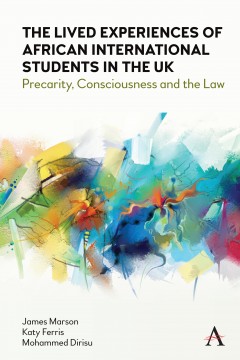The Lived Experiences of African International Students in the UK
Precarity, Consciousness and the Law
By James Marson
Katy Ferris
Mohammed Dirisu
Other Formats Available:
- About This Book
- Reviews
- Author Information
- Series
- Table of Contents
- Links
- Podcasts
About This Book
International student migration makes a significant contribution to higher education in the United Kingdom, with Southern Africa, and Nigeria in particular, positioned joint sixth in the top ten of sending countries. Many of these student-migrants, in supplementing their finances to fund their studies in the United Kingdom, undertake employment. Temporary and/or part-time employment is integral to the student-migrant experience, despite the express purpose of their admission into the United Kingdom designated for study purposes and not work. This explicit object is reflected in restrictions affixed to international students’ employment rights whilst studying; they are generally restricted to a maximum of 20 hours of work per week during term time and proscribed from working full time or as independent contractors. Given the scant regard this topic has received in the existing literature, this study offers an examination of students’ lived employment experiences under these rules. Adopting a qualitative methodology through interviews and ethnographic observations with cohorts of international student workers from sub-Saharan Africa, the study presents a holistic picture of the lived experiences, through employment practices, of this group of student-migrant-workers. The study aims to offer contributions to the existing body of literature in two principal ways. First, it accounts for the employment experiences of student-migrants through the analytical framework of ‘precarity’ by examining the various manifestations of insecurity in the students’ lived realities, nuanced by structures of migration control and labour market temporalities. The study highlights that these students are forced to contend with intersecting forms of insecurities in their labour market encounters. This reifies their dependence on certain forms of employment and relationships, and renders them increasingly susceptible to unfavourable work conditions including low pay, exploitation, discrimination and abuse. This aspect of the study is concluded by advancing an argument that higher education institutions, as the primary sponsors of these students, must do more to forearm them with candid insights on what to expect of the temporary employment market and furnish them with a comprehensive knowledge of their accruable employment rights.
For the second contribution, adopting the socio-legal schema of legal consciousness, the study considers the student-migrants’ relationship with the law by way of the legal restrictions on their employment and interrogates their agency in their efforts to derogate from these rules. These derogations are conceptualised as ‘semi-legality’, an analytical construct that marks an indeterminate halfway point between utter illegality and compliance, as it applies to labour. The study highlights that there are two discernible plots towards enabling semi-legal employment and evading detection thereof. The first involves the students undertaking work with different employers simultaneously; meanwhile, the second entails students contracting for work through the use of private limited companies as a trading structure. The study argues that the specifics of the student’s violation of visa rules has profound distinctive implications for their legal consciousness’ disposition and more so the manner in which they simultaneously resist and make recourse to the law and its institutions towards resolving workplace grievances.
Reviews
“The Lived Experiences of African International Students in the UK provides insightful and topical analysis of international students’ experiences of insecure work. It contributes to the debates in law and socio-legal studies, focusing on the inconsistencies between the desire to attract highly-skilled migrants and the neoliberal policies that create low-pay and low-skilled employment in a deregulated labour market.” —Dr Sanna Elfving, University of Bradford, UK
“The two principal frames of analysis employed in The Lived Experiences of African International Students in the UK are expertly chosen and well expedited. The word is well organised. It is well set up where the earlier parts identify the gaps and how to plug those gaps, whilst the methodology is carefully chosen, dissected and critiqued, before the authors continue to the main empirical work. Methods and methodology are convincing and well justified. Structurally, it makes sense for the findings to then flow from here in later chapters. Thematic analysis is appropriate given the nature of the (qualitative) data. An inductive, data-driven, approach to the findings is then offered whereby original data is presented to help make claims, inferences are credible and the narrative is told convincingly.”—Dr Anna Kawalek, Leeds Beckett University, UK
Author Information
James Marson is a Reader in Law and Senior Fellow of the Higher Education Academy. He holds a PhD from the University of Sheffield.
Mohammed Dirisu is a Lecturer and Researcher at Sheffield Hallam University, and holds a PhD from the same institution. He has special interests in socio-legal research, human rights, social justice, migration, business ethics, corporate governance and social responsibility.
Katy Ferris is Associate Professor in Business Law at Nottingham University Business School. She is author of textbooks and articles in law with a special interest in welfare, legal education and social justice.
Series
Table of Contents
Preface; Acknowledgements; Legislation; Case Law; 1. Introduction; 2. Methodology; 3. Student Migration and Global Inequality; 4. Migration as a Socio- Legal Phenomenon; 5. The ‘Student- Migrant-Worker’ Meets ‘Precarity’; 6. The ‘Utterly Transactional Worker’; 7. Semi-Legal Working?; 8. Conclusions; Bibliography; Index.
Links
Stay Updated
Information
Latest Tweets



